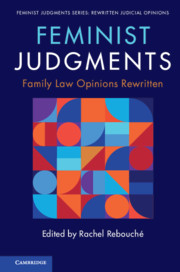The U.S. Feminist Judgments Project is pleased to announce the publication of two new volumes in the Cambridge University Press series.
 Feminist Judgments: Family Law Opinions Rewritten (Rachel Rebouché ed. 2020)
Feminist Judgments: Family Law Opinions Rewritten (Rachel Rebouché ed. 2020)
This book provides new, feminist perspectives on famous family law cases that span generations. The chapters take court decisions and rewrite them with feminist ideas in mind. Each rewritten opinion is penned by a leading scholar who relied only on materials available at the time of the original decision. The decisions address topics such as the criminalization of polygamy, intimate partner violence as a ground for asylum, the legality of gestational surrogacy, the rights of cohabitants, discrimination against transgender parents, immigration rules governing non-citizen parents, and child welfare and child support systems, among others. Each opinion is accompanied by a commentary that explains the original opinion as well as its contemporary relevance, and each commentary also is authored by a respected scholar. The combination of a rewritten opinion and its commentary provides an in-depth examination of the most important topics in family law.
Feminist Judgments: Reproductive Justice Rewritten (Kimberly Mutcherson ed. 2020)
Reproductive justice (RJ) is a pivotal movement that supplants the language and limitations of reproductive rights. RJ’s tenets are that women have the human rights to decide if or when they’ll become pregnant, whether to carry a pregnancy to term, and to parent the children they have in safe and healthy environments. Recognizing the importance of the rights at stake when the law addresses parenting and procreation, the authors in this book re-imagine judicial opinions that address the law’s treatment of pregnancy and parenting. The cases cover topics such as forced sterilization, pregnancy discrimination, criminal penalties for women who take illegal drugs while pregnant, and state funding for abortion. Though some of the re-imagined cases come to the same conclusions as the originals, each rewritten opinion analyzes how these cases impact the most vulnerable populations, including people with disabilities, poor women, and women of color.
Tables of contents for both books are available at the Cambridge website (here).
Other books in the series are Feminist Judgments: Rewritten Opinions of the United States Supreme Court (Kathryn M. Stanchi, Linda L. Berger & Bridget J. Crawford eds., 2016) and Feminist Judgments: Rewritten Tax Opinions (Bridget J. Crawford & Anthony C. Infanti eds., 2017). Volumes slated for publication later this year are Feminist Judgments: Rewritten Employment Discrimination Opinions (Ann C. McGinley & Nicole Buonocore Porter eds.); Feminist Judgments: Rewritten Trusts & Estates Opinions (Deborah S. Gordon, Browne C. Gordon & Carla Spivack eds.) and Feminist Judgments: Rewritten Tort Opinions (Martha Chamallas & Lucina M. Finley eds.).

